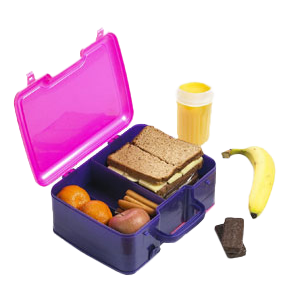The Waste-Free Lunch

Examine what you throw away after lunch. Can that package be eliminated or replaced with something reusable or recyclable? What resources were used in the manufacture of those one-use wrappings? Ever notice how expensive those individual-sized packages are?
The average student throws away 67 pounds of lunch waste per school year! How many kids are in your classroom? In your school? You can make a difference by learning how to pack a waste-free lunch.
Are You an Educator?
Charleston County Environmental Management works with local schools to reduce waste and increase recycling by offering waste-free lunch presentation and initiatives. If you are an educator interested in teaching students about how to reduce waste, contact the Environmental Management Department at (843) 720-7111 for more information.
Tips on how to have a Waste-Free Lunch!
- Don't consume more than your lunch at lunch time.
- Use lunch boxes, canvas bags, insulated carriers, and reusable ice packs.
- Reuse plastic containers.
- Use reusable thermoses or refillable bottles; or recyclable bottles and cans. Avoid cartons; juice boxes and pouches are not recyclable.
- Plastic food bags, especially bread bags, are great sandwich bags only if you use them again and again.
- Use real utensils and cloth napkins; wash them and reuse.
- Bring only what you can eat.
Why a Waste-Free Lunch?
- A waste-free lunch is reducing, reusing & recycling. Be part of the solution.
- Schools save money spent on waste hauling.
- Families save money on food bought in bulk.
- Conserve resources; coal, oil, natural gas & trees.
- Save landfill space. Save energy. Prevent pollution.
Some Facts
- Containers and packaging make up 32.7 percent of all U.S. solid waste.
- There is no such place as "away." Consider the packaging you'll be throwing out before you buy it.
- $2.65 is the average cost of a waste-free lunch vs. $4.02 for a typical lunch. Save $6.85 a week!
- A plastic bottle in the garbage will last for hundreds of years.
- Recycling one glass container saves enough energy to light a 100-watt bulb for four hours.
- Plastic bags are a frequent cause of injury or death to sea turtles and other South Carolina marine and wildlife.
Charleston County
ChasCountyGov
ChasCountyGov
Charleston County Government
CharlestonCountyGovernment
CharlestonCountyGovernment
CharlestonCountyGov
ChasCountyGov